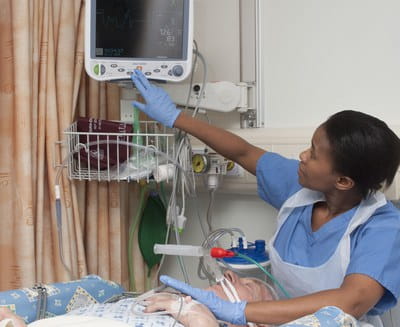CCrISP Appeal
Care of the Critically Ill Surgical Patient Course (CCrISP)
Background information
 Critically ill patients are those that are being cared for in Intensive Care or High Dependency Units (ICUs and HDUs) and as the name suggests are in a very serious and vulnerable medical condition. These patients may be the consequence of road traffic accidents, emergency admissions, or where following surgery a patient’s condition has deteriorated to a dangerous level. The capacity of surgical patients to withstand surgery and any complications depends on their age, underlying disease process and any coexisting illnesses. Once surgical patients develop organ failure and therefore, require ICU support, overall mortality is over 50%. However as critical illness develops, it is detectable and may be treatable.
Critically ill patients are those that are being cared for in Intensive Care or High Dependency Units (ICUs and HDUs) and as the name suggests are in a very serious and vulnerable medical condition. These patients may be the consequence of road traffic accidents, emergency admissions, or where following surgery a patient’s condition has deteriorated to a dangerous level. The capacity of surgical patients to withstand surgery and any complications depends on their age, underlying disease process and any coexisting illnesses. Once surgical patients develop organ failure and therefore, require ICU support, overall mortality is over 50%. However as critical illness develops, it is detectable and may be treatable.
The Royal College of Surgeons identified a need to develop a course to teach young surgeons to predict, prevent and treat patients before this stage is reached so that some patients may not require ITU care and those that do are given the best chances of a successful outcome. The Care of the Critically Ill Surgical Patient course was developed and first run in 1996 and has made a significant contribution to improving care for surgical patients. Due to changes in surgical training, there is a need to update the course to maintain and improve upon the achievements already made.
Why is training in critical care so important?
 Traditionally, junior surgeons have been trained well in operative skills and are thoroughly examined on textbook knowledge. However, the ability to care practically for unwell or critically ill surgical patients who are on the surgical wards following major surgery or emergency admission requires an additional skill set. There is significant evidence that late diagnosis of complications, failure to appreciate clinical urgency and knowing when to seek advice, all contribute to poor outcomes in surgical patients.
Traditionally, junior surgeons have been trained well in operative skills and are thoroughly examined on textbook knowledge. However, the ability to care practically for unwell or critically ill surgical patients who are on the surgical wards following major surgery or emergency admission requires an additional skill set. There is significant evidence that late diagnosis of complications, failure to appreciate clinical urgency and knowing when to seek advice, all contribute to poor outcomes in surgical patients.
Studies have shown that in hospital patient death from thoracic or abdominal injuries is preventable by prompt and effective surgical intervention. In short, hospital doctors helping look after potentially ill patients must recognise and understand the significance of life-threatening conditions in the abdomen and chest to prevent these deaths. The cause of death in 80% of this group is either sepsis or other causes of multiple organ failure, which may be the result of inadequate or delayed initial resuscitation and management and may be preventable.
Changes in training programmes and on-call commitments now mean that trainees can sometimes be responsible for the in-hospital care of large numbers of patients spread over several wards. It is clear that using a structured and prioritised system of management helps junior doctors function well even when faced with unfamiliar clinical situations which at first seem unfathomable. In critical care, many crises can be managed satisfactorily by prompt interventions to support the vital organs and by prompt diagnosis and correction of a modest number of recurring abnormalities. In fact, most junior doctors possess considerable theoretical knowledge but they can find it difficult to bring this to bear in a relevant manner when emergencies arise.
The (CCrISP®) course assists young surgeons to apply the knowledge and skills necessary to look after critically ill surgical patients. By using a system, immediately life-threatening problems are dealt with and the doctor is led on to diagnose and treat the underlying problem. The system serves as a prompt at times of crisis but also as a framework around which the doctor can use both their existing and new knowledge appropriately.
What has been achieved so far?
The CCrISP® course first ran in 1996 and there is no doubt that it has made a significant impact of the care and survival of some of the most vulnerable hospital patients. Since its inception over 900 courses have been delivered to over 35 regional centres in the UK. CCrISP® is now in its 3rd edition and a spin off course START (Systematic Training in Acute illness Recognition and Treatment for surgery) for Foundation doctors has been developed. Some 450 faculty members are involved in delivering the programme. The course has also been exported to Australia, New Zealand, Malaysia and Italy.
We'd love to talk to you about Making Surgery your Legacy...
We want to share in your vision as to what your legacy gift could achieve, so if you are considering leaving a legacy to RCS England or have already done so, we are here to help.
Telephone
Telephone 020 7869 6086 to talk with a member of our fundraising team
Office hours are Monday to Friday, 9am - 5pm.
